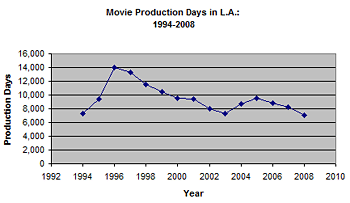Updated Friday at 5:50 pm:
After years of declining movie production in Los Angeles County, the city may finally get an official devoted to keeping Hollywood here, and happy.
How much is the decline in production? A whole lot.
This year, only three big-budget movies have applied for permits to shoot in Los Angeles, according to Film LA, which issues them.
That compares to 21 major feature films – meaning those with budgets higher than $80 million – that shot on the streets of the city in 2008.
And that figure is down from the peak of 71 films shot with permits in L.A. in 1996.
To many, that feels like red-zone territory.
 At a city council meeting on Wednesday, council president Eric Garcetti announced that he would propose the appointment of a “film czar” to focus on film industry efforts and relations with the studios.
At a city council meeting on Wednesday, council president Eric Garcetti announced that he would propose the appointment of a “film czar” to focus on film industry efforts and relations with the studios.
In an interview with TheWrap, Garcetti said the role was long overdue. "California doesn’t have a problem with runaway production. We have a problem with ran-a-way production," he said.
"We need to think creatively about how to help with the logistics of filming, the tax structure that keeps people away and what advantages we have here in Los Angeles and how we can make them more convienent and less expensive for our key trademark industry."
Garcetti spokeswomen Julie Wong said Garcetti is not considering any candidates for the new position yet, and he hasn’t decided whether the “czar” will come from the entertainment industry or city government.
The position is envisioned to be based in the office of Mayor Antonio Villaraigosa.
Mayoral spokesman Jonathan Powell said Villaraigosa had only just learned of the proposal, but added, "The mayor feels strongly that the entertainment industry is the lifeblood of our economy. He’s always open to ideas to keep the industry in LA, and to allow it to grow as much as possible, because it puts people back to work and grows the economy in general."
Garcetti proposed creating the position after reviewing a report on runaway production conducted by the Council’s Chief Legislative Analyst after “Ugly Betty” moved its production to New York last year.
The report cited a study by the Los Angeles Economic Development Corporation that determined a one-hour scripted program like “Betty” employs 180 people, supports 540 indirect jobs and generates about $80,000 in state sales tax revenue.
That same report also led to the passage of a $500 million “Ugly Betty tax credit” in the state budget just last week, the first major tax incentive program for the industry ever adopted by the state.
There’s good reason for the shift toward government intervention. Film production is the third-largest source of commerce for Los Angeles County, after international trade and tourism.
And production is down radically in California in general and Los Angeles particularly because of all the filming incentives adopted by other countries and states.
Paul Audley, the head of Film L.A., a non-profit that fills this function currently along with issuing film permits for local production, said a “film czar” would be a welcome move.
“Each of the LA County districts have issues with production leaving, but given that every council member has issues, things do slip through the cracks,” said Audley. “And in a down economy, you want to know if there are ways to do more and help.”
A so-called “film czar” could also legitimately lobby Sacramento for the entertainment industry, which a non-profit like Film L.A. is not permitted to do.
But some in the entertainment industry questioned whether a film czar could really make a difference in the migration of production out of state.
“People in the industry will say : what can you give me?” said one veteran entertainment executive. “People want tax breaks, and an easy permit process. The big problem here is that you have to hire unions, so anything done in L.A. is more expensive.”
Between the state-funded tax break on lower budget movies, and the film czar in the city of LA, a government-backed effort has finally gotten underway. But the sums may be too small, and come too late, to have an impact.
"I am happy for [the incentive], yet it does not do enough," said producer Lauren Schuler Donner. "The truth is we all would rather stay in Los Angeles with our families than travel to anywhere else for months on end. But a tax incentive of anywhere from 25% and upwards stretches our budget.
She added: "I think the California tax incentive, therefore, might have a bit of an impact, but it would have a greater impact if the percentage of tax rebate were higher, lessening restrictions on the cost of the movie, and no mandates on where the tax credit can be implied."
Having $1 million on a $50 million movie would be welcome, said the executive. “It’s nice to have, but it’s not going to change your life, or your decision.”









